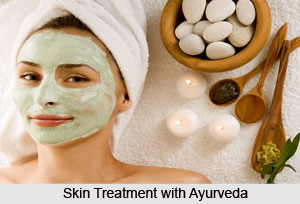 There are different types of skin according to Ayurveda. The skin type depends on fundamental element that is predominant on the skin. Depending on this element, the texture and nature of the skin is determined.
There are different types of skin according to Ayurveda. The skin type depends on fundamental element that is predominant on the skin. Depending on this element, the texture and nature of the skin is determined.
`Space` Predominant Skin: The fundamental element `space` reflects the impact of the environment on the skin type. This type is skin texture is thinner than other skin types, dull in lustre and prone to peeling, injury and there are chances of getting scratched. The pores of the skin are very small in size. With aging this types of skin even becomes thinner. The space predominant skin is very delicate and hence can`t be exposed too much in sun or wind. Soft massage and soft touch are very helpful for this type of skin. Facial skin of this type is very sensitive to electromagnetic vibrations and negative energy in the environment.
`Air` Predominant Skin: Air is another fundamental element that provides lightness and delicacy to the skin. Air predominant skin is very dry and becomes excessive dry in the winter season. This type of skin tends to be dry during the hot weather season also. The pores are little larger than space predominant skin type.
Air predominant skin is much sensitive to cold and windy weather. The skin type is delicate but not as delicate as the space predominant skin type. Like space predominant skin air predominant skin type is also very prone to peeling off or flaking, and susceptible to getting injury or scratch.
`Fire` Predominant Skin: Fundamental element fire brings natural glow and luminosity to the skin. Fire predominant skin has a pinkish tone and warm to touch. This type of skin has medium sized pores.
Fire predominant skin is most prone to the effect of emotional trauma. People, having fire predominant skin cannot tolerate sun and hot foods like long hot red peppers and cayenne pepper etc.
`Water` Predominant Skin : When water as the fundamental element is predominant in the skin, it gives the skin a supple, dewy look. The skin is pale, relatively thick and feels cool to touch. This type of skin has a dull look, overly hydrated and semi-thick. The pores on this type of skin are semi dilated and can be clogged very easily. The skin can hold toxins. The water predominant skin is susceptible to breakouts and other serious problems like eczema. This type of skin is more resistant to light or any other negative vibration impact.
`Earth` Predominant Skin: When the fundamental element `Earth` is predominant it imparts firmness and thickness to the skin giving it definite form and structure. This type of skin is typically greasy. This is the thickest type of skin among the other skin types. The skin has large pores. The earth predominating skin looks dull if not meticulously cleaned and exfoliated regularly. But if this skin is properly cleansed the earth predominating skin does not show the usual signs of aging, like wrinkles or sags. This skin type retain toxin than any other skin type. If not taken care of the skin properly this type of skin develops much problem because of its inherent oiliness.





